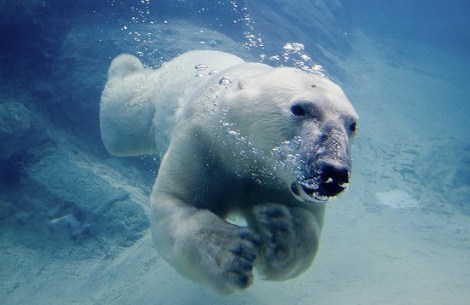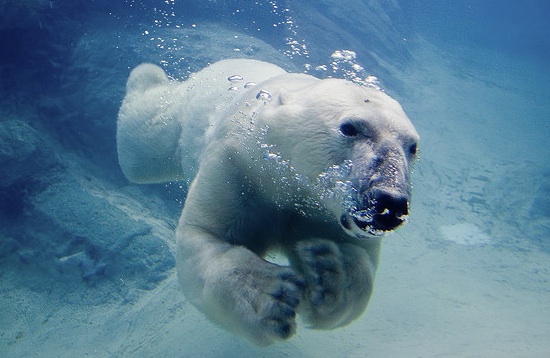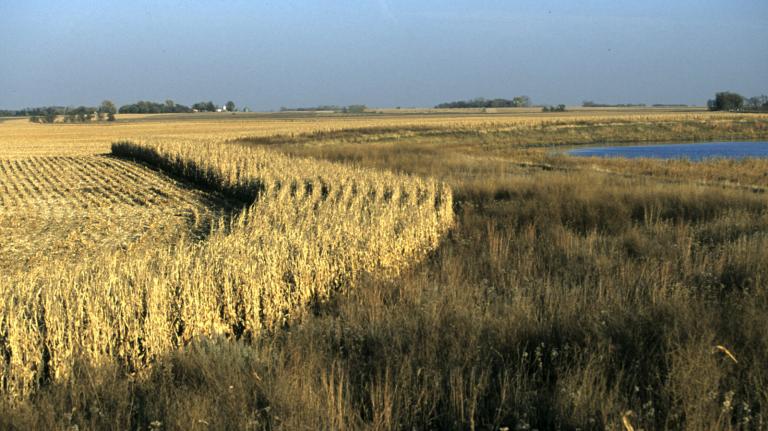
Through a bit of evolutionary serendipity, polar bears are cute. They are big and fuzzy and have thick, dopey heads. This is helpful to the polar bears, because it’s given the animals a powerful tool in their fight for existence. “Do you want polar bears to go away?” fundraising pleas ask above a sharp photograph of a bear’s clear black eyes.
To which oil companies say, “Only if they’re in the way.” Last week, a federal court in Alaska overturned a Fish and Wildlife Service habitat designation for polar bears after the fossil fuel industry sued, complaining that the habitat interefered with oil exploration. From the Wall Street Journal:
A U.S. court in Alaska has overturned a federal rule aimed at protecting polar bear habitat in the Arctic, handing a victory to the oil and natural-gas industry.
The rule, established by the U.S. Fish and Wildlife Service, is “valid in many respects,” but the agency didn’t follow all the legally required steps before adopting the regulation, U.S. District Court Judge Ralph R. Beistline wrote in the decision, which was dated Thursday and published Friday. …
The government designated barrier islands, offshore sea-ice and “denning” areas, where female polar bears are known to make dens where they give birth to their young during winter months, as critical habitat. At the time of the designation, in November 2010, the Fish and Wildlife Service said the areas were “essential for the conservation of the bear.”
It’s fossil fuel industries that have put the polar bear in its current plight. Rampant greenhouse gas emission and the warming that has ensued has caused Arctic ice levels to plummet. With less ice, it becomes harder and harder for bears to conserve energy and to find food. As we noted in 2007:
As sea ice thins, and becomes more fractured and labile, it is likely to move more in response to winds and currents so that polar bears will need to walk or swim more and thus use greater amounts of energy to maintain contact with the remaining preferred habitats.
The government tried to create a protected habitat, a place where bears could hunt and rest as best they could without additional interference. But unfortunately for the bears, the Fish and Wildlife Service put the reserve on land that was already inhabited: by oil. So the Alaska Oil and Gas Association and the American Petroleum Institute sued, with the oil-obsessed state’s help.
The AOGA issued a pleased-as-punch statement [PDF] in response to the court ruling, including this quote from executive director Kara Moriarty.
AOGA members care as much about protecting Alaska’s environment and wildlife as anyone else, but we also recognize the need to responsibly develop our natural resources in order to keep the state’s number one economic driver healthy.
Emphasis added, to highlight the part of the quote that is bullshit.
Even worse was the statement from Alaska’s governor. Again from the Journal:
Alaska Gov. Sean Parnell said Friday that he “applauded” the court’s decision.
“The Fish and Wildlife Service’s attempt to classify massive sections of resource-rich North Slope lands as critical habitat is the latest in a long string of examples of the federal government encroaching on states’ rights,” Mr. Parnell said.
You can hear Parnell salivating as he says resource-rich. After all, he — along with every resident of Alaska — has a dog in the fight over drilling. Last year, every Alaskan received $878 thanks to the state’s Permanent Fund, which distributes profits from oil drilling to residents. More drilling equals more money for the state, meaning happier voters in Parnell’s eyes. More polar bears don’t do him much good at all.
Making the moral of the story this: Polar bears may be cute, but the faces on dollar bills are a lot cuter.



